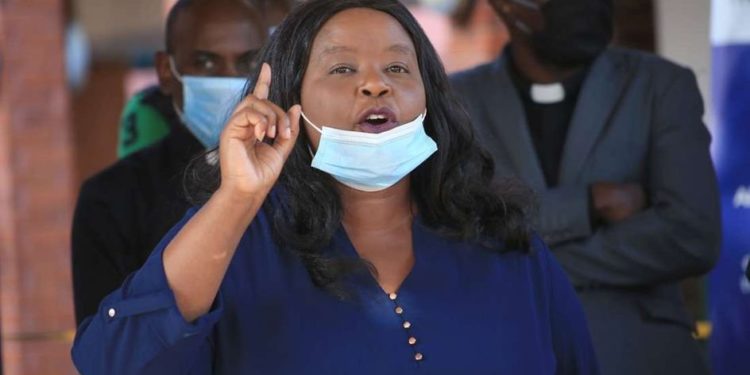In a press briefing at the hospital, Bishop Wanjiru said she had recovered from the disease.
And after leaving the hospital, she went straight to her Jesus is Alive Ministries church, where she held prayers with a few members. Ms Wanjiru was admitted to Aga Khan’s Intensive Care Unit from Thursday last week.
This seemed to go against the common practice, where Covid-19 patients are held for 14 days before being discharged after testing negative. There were queries about her quick recovery and release from hospital, even as six of her contacts remained under treatment in quarantine.
But the acting Health Director-General Patrick Amoth said the less symptomatic a patient is, the faster they shed the virus.
Dr Amoth said after the first test confirms one positive, two other tests are done to determine if one is recovering or succumbing to the virus.
“The second test is normally conducted immediately one shows lesser symptoms: it can be after three days or less, depending on how the patient is improving. Then the last one is done after 24 hours,” Dr Amoth said.
FOOD POISONING
If the two consecutive tests turn negative, then the patient is released, but if they turn positive, he/she is retained at the hospital. His statement explains how Ms Wanjiru could have shed the virus that fast.
But what is not clear from her narrative is the fact that she said she had been put on oxygen, not because she was struggling to breathe, but due to other health issues she did not reveal.
Oxygen therapy is prescribed for people who have difficulty breathing on their own, especially those with shortness of breath, rapid breathing, dizziness, lightheadedness and/or fainting spells and headache.
The former MP did not indicate she was in ICU, but the Sunday Nation learnt she was picked up from her house to the hospital by an ambulance. She denied her hospitalisation had to do with Covid-19.
“My going to the hospital was not related to Covid-19 or a cough but food poisoning,” she told journalists. “On Sunday night, I had a serious diarrhoea. And on Monday morning I went to the hospital for check-up.”
On the first day, she said, she was treated for amoeba and bacterial infection in the blood and not Covid-19. On the second day, when she went back for antibiotic therapy, the doctor advised her to do a Covid-19 test. “This is when I was confirmed Covid-19 positive,” she said.
PRAYER SESSION
The Jesus is Alive Ministries bishop tested positive alongside her two grandchildren, who have also recovered from the virus, according to her. Six of her “staff” are still in hospital.
The bishop was alleged to have been holding prayers at her home and that the six who turned positive are worshippers. She denied these claims.
She also took the opportunity to advise Kenyans on protection measures against the coronavirus. “Covid-19 is real and should be taken seriously, not only when you are at work. I did not leave my home. I had no visitors, and those saying that I held prayers in my house are lying. I had my family members and my staff,” she said.
While narrating how she got infected, she said the virus was likely brought in by one of her staff, who had been off-duty and left her house.
“We take some things for granted. When we are at home we don’t put on masks. One person can be off-duty, comes back and, without questioning where they have been, they get to work normally,” she said.
She appealed to Kenyans to put on masks even when at home and hosting visitors. So is she healed? She said she is.
ANTIBODIES
According to the World Health Organisation, recovering from Covid-19 is more complicated than simply feeling better. Recovery, the international health agency says, involves biology, epidemiology and a little bit of bureaucracy too.
How does one’s body fight off Covid-19? “Once a person is exposed to the coronavirus, the body starts producing proteins called antibodies to fight the infection. As these antibodies start to successfully contain the virus and keep it from replicating, symptoms usually begin to lessen and you start to feel better,” the WHO states.
If all goes well, one’s immune system will completely destroy the virus in the system. “A person who was infected with and survived a virus with no long-term health effects or disabilities has recovered. On average, a person who is infected with SARS-CoV-2 will feel ill for about seven days from the onset of symptoms,” says the WHO.
Even after the symptoms disappear, there still may be small amounts of the virus in a patient’s system, and they should stay isolated for an additional three days to ensure they have truly recovered.









